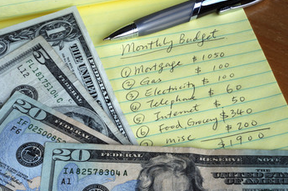Personal Budget: Importance and How to Maintain?

This article focuses on importance of keeping an updated personal budget and why it is so important for the management of finance.
The hard truth is that most individuals/families do not find a need to keep a budget because they are confident of how, when, why of the spent money. Well this is not true! And the reality is that, this thought can only lead to mistakes. And by the time people realize that having a monthly budget is essential, the financial problems pile up.
Putting together a budget gives us detailed information about the income and expenses. And as they say, information is power. Because it allows us to make better spend decisions. By putting together a budget, you review all the monthly expenses made and in this process you get aware of them. So the main advantage is to become aware of our financial reality and take care of it, whether it is positive or negative.
What advantages can you get by keeping an updated monthly budget?
Here is the list the advantages of having an update and control the budget on a weekly and monthly basis:
- Know your income.
- Know your fixed and necessary expenses.
- Know your variable expenses, which may allow you to start saving or increase your savings through its control.
- You can get real information to make rational decisions consciously about your finances and avoid impulse or unnecessary purchases.
- You will be able to identify your habits and behaviors related to money, in order to make decisions about them.
- It will allow you to identify current situation or starting point to reach and plan the financial objectives.
- You will be able to plan in the medium and long term depending on your income and expenses to organize trips, buy a car, a department or start developing your own business.
- You will be better prepared for contingencies that are beyond the control. For example, an economic crisis, a family or work problem.
How to start budgeting?
To begin with, you have to write down all the monthly expenses along with the income. You can look for information in the credit or debit card statement or in the monthly bills. This will identify the vast majority of fixed costs.
Then to identify the variable monthly expenses, you will need to keep track of all your expenses, for few initial months. For this, you can:
- Buy a nice booklet and take it everywhere with you, to write down the amount, description and category of each expense.
- Create a note on your cell phone “Expenses Month XX” to keep a record of expenses.
- Or you can download an App to keep track of expenses, since the cell phone is with us all day. And these App also allow you to categorize and then get the detail of all your expenses to analyze them. Using app, it’s super easy to record expenses and categorize.
Another option to search for Apps is to go to AppStore or GooglePlay on your mobile and search “best apps for money management”. And you will be presented a list of apps, according to the users ratings, then you can be sure that they are good and work.
If you already have a control over the income and expenses. What next?
Once you have a tool/process that allows you to control at least your income and expenses you will have the necessary information for:
1) Know your spending trends, i.e. how you spend money and on what or on whom. When you see all the expenses grouped by categories, you become aware of what you’ve spent the money on and this is a very powerful. At the time, you will become aware of expenses that could have been avoided. So you’re going to identify good and bad related to money, that will allow you to put together a plan to improve your financial situation.
2) Make good decisions, by having information about how you spend money. You can create action plan to reduce expenses, save more, decide if it is worthwhile to make a big expense according to your personal financial condition, evaluate how much time you need to save to reach a particular goal. When it comes to money, you should always make sure to make rational and logical decisions. Having this information will prevent you from making impulse purchases or defining unattainable goals that will generate frustration in the future.
3) Have a control tool to meet your objectives. By keeping track of expenses, you can month by month or week by week evaluate how you are using money and if you are doing everything necessary to meet your objectives. Controlling allows you to detect the deviations and adjust your behavior or the plan of action to fulfill the objective. This is because it can happen, for example, that you have set a goal of a very ambitious saving and see that it is impossible to fulfill, then with this monthly control you can go adjusting the plan.
Hope this post will help you. Maintaining a personal financial budget will surely help in knowing the advantages (of course, there won’t be any disadvantages). Although it’s hard sometimes to find the time to maintain and it can even be a bit tedious, but the results will really make a difference and improve the quality of life. By doing this, you will know how much money you have or whether an unexpected situation is taking us by surprise. The budget prepares you for the unexpected and assures you to reach your goals and dreams.
Author Bio:
Hi, I am Nikesh Mehta owner and writer of this site.
 I’m an analytics professional and also love writing on finance and related industry. I’ve done online course in Financial Markets and Investment Strategy from Indian School of Business.
I’m an analytics professional and also love writing on finance and related industry. I’ve done online course in Financial Markets and Investment Strategy from Indian School of Business.
I can be reached at nikeshmehta@allonmoney.com. You may also visit my LinkedIn profile.



